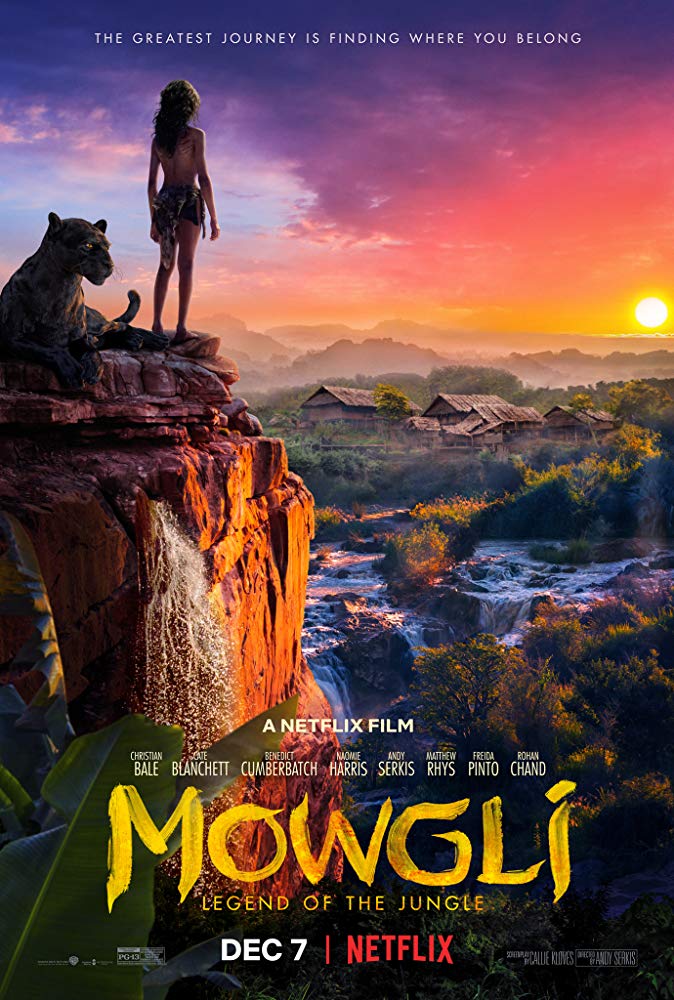MOWGLI: LEGEND OF THE JUNGLE (NETFLIX) (2018)
SYNOPSIS: An orphaned boy raised by animals in the jungle seizes his destiny while confronting a dangerous enemy -- and his own human origins.
MOVIE REVIEW:
An epic seven years in the making, ‘Mowgli: Legend of the Jungle’ finally debuts via Netflix after being handed over by its studio Warner Bros. Intended as the directorial debut of motion-capture specialist Andy Serkis, its long and circuitous road to the big- and small-screen involved a long post-production process that even saw Serkis complete his second feature ‘Breathe’, and then another two-year delay when Disney big-budget remake of its own 1967 movie beat it to its own game. While it is understandable why Warner Bros would doubt if audiences had the appetite for yet another ‘Jungle Book’, Serkis’ version is indeed sufficiently different – and darker – for it to stand on its own.
True to what Serkis had promised, ‘Mowgli’ is a decidedly more adult vision of Rudyard Kipling’s book, which doesn’t flinch from portrayals of death, violence and moral contradictions. That ambition is clear from the very start, which sees the title character’s parents being killed, and possibly eaten, by the Bengal tiger Shere Khan (Benedict Cumberbatch), portrayed here as a sneering and psychotic megalomaniac seeking dominance of the animals in the jungle. Midway into the film, Mowgli (Rohan Chand) is captured by a pack of monkeys and brought to their lair atop a waterfall under Shere’s command, and the sequence is terrifying to say the least, including a dizzying scene where Mowgli meets the enormous python Kaa (Cate Blanchett) that slithers and strikes around him on all sides simultaneously.
To be sure, Serkis isn’t being exploitative by any measure; rather, Serkis doesn’t shy away from depicting the jungle as a treacherous place, that nature can be harsh when it comes to the laws of survival, and that humans can sometimes be even crueller. This is ultimately Mowgli’s coming-of-age story, and he is our surrogate through whom we acquaint ourselves with these realities. In order to remain a member of the wolf pack he is raised, a teenage Mowgli must prove his abilities like the other wolf-cubs in outrunning the ink-black panther Bagheera (Christian Bale). Likewise, his subsequent exile to live amongst mankind necessitates that his animal spirit first be broken, caged up like an animal in the village. And last but not least, Mowgli will also be confronted by mankind’s own sadistic practices during his time with the humans, as he comes face to face with the taxidermised head of an albino wolf he used to play with.
Mowgli must choose where he belongs – with man or with wolf – although he is described as “man and wolf, both and neither”. That decision forms the context of the finale, which while predictably sees him confront his foe Shere Khan, unfolds too in surprising, even shocking, ways. Without giving away too much, let’s just say that he engages both Shere and his new human keeper Lockwood (Matthew Rhys), a British hunter hired by the Indian villagers, in a game of deception that is at once bold yet ethically questionable. It will require some deftness on the part of parents to explain to their children just why Mowgli decides to turn rather viciously against someone who has fed and groomed him, which underscores just how adult-skewing this version of the animal fable plays.
Yet it is also true that ‘Mowgli’ therefore comes off like a strange animal that is definitely not suitable for younger kids but not quite adult material as well. The first half is especially illustrative of this tension, what with scenes of Mowgli talking and laughing with Baloo (voiced here by Serkis himself) and Bagheera juxtaposed against others of Mowgli being forced to demonstrate just how quickly he can learn the ways of the wolf in order to belong. It is quite evident that Serkis struggles with finding the right balance of levity and solemnity at the start, and even with heavyweight actors like Bale, Peter Mullan, Cumberbatch and Blanchett lending their voices to the characters, you’ll find it somewhat inevitably more challenging reconciling the grimmer tone with the fact that the animals actually talk (and not mimicking the humans like in the ‘Rise of the Planet of the Apes’ trilogy, mind you).
Like we said at the start, that ‘Mowgli’ is finally seeing the light of day is something of an accomplishment in and of itself, and it is heartening to see that Serkis’ labour of love isn’t quite the overblown disaster that some were predicting it would be after the numerous delays and eventual decision to offload it onto Netflix. It is indeed understandable why Warner Bros would struggle to define just who it would choose to sell this movie too, but equally Serkis deserves credit for applying much more mature sensibilities to this treatment of Kipling’s source material. There is much to enjoy in both the live-action and voice performances, and in the familiar yet effective story of Mowgli’s crowning as part of the jungle, and if you’re willing to let yourself be transported to a darker yet richer telling of ‘The Jungle Book’, we’re quite sure you’ll enjoy this walk on the wilder side of the jungle.
MOVIE RATING:




Review by Gabriel Chong

